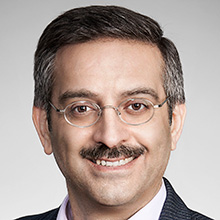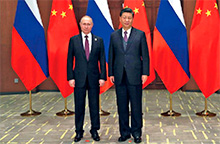
Why Did the Armenia-Azerbaijan Peace Process just Fail?  By Elkhan Nuriyev, PhD, Eastern Europe-Global Area (EEGA) fellow at Leipzig University
By Elkhan Nuriyev, PhD, Eastern Europe-Global Area (EEGA) fellow at Leipzig University
The ongoing escalation of Armenian-Azerbaijani conflict in Nagorno-Karabakh is a most serious and significant one - just not surprising at all. This is mainly due to the lack of tangible progress in the OSCE Minsk Group-led peace talks between the two sides, which have been held since 1994. The absence of substantive negotiations over de-occupation of Azerbaijani territories, return of internally-displaced persons to the regions of their origin, the unblocking of transport, economic and other communications with Armenia has fueled strong skepticism about peaceful conflict resolution. Back in the summer it was evident that the smell of a new war had already hung heavily over the conflict-torn area. READ MORE
- EGF Editor |
Published on EGF: 07.10.2020
| Security
-
Nagorno-Karabakh Crisis: Azerbaijan’s Fraying Temper  By Khayal Iskandarov Ibrahim, Rashad Tahirov Kamal, PhD in philology, associate professor Sadi Sadiyev Saleh
By Khayal Iskandarov Ibrahim, Rashad Tahirov Kamal, PhD in philology, associate professor Sadi Sadiyev Saleh
Another escalation in Nagorno-Karabakh in early morning on September 27, 2020 brought Armenian-Azerbaijani conflict once again to the focus of world community. Approximately 30 years have elapsed since this conflict was initiated. However, there has not been any substantial progress in the efforts to solve the problem. The prominent political figures in Armenia, who more or less understood the consequences of their actions and endeavored to solve the problem, were either ousted or assassinated. READ MORE.
- EGF Editor |
Published on EGF: 01.10.2020
| Security
-
The Recent Evolution of Azerbaijan–Turkey–Armenia–Russia Relations and Its Implications for the Settlement of the Karabakh Conflict  By Benyamin Poghosyan, PhD, Chairman, Center for Political and Economic Strategic Studies
By Benyamin Poghosyan, PhD, Chairman, Center for Political and Economic Strategic Studies
The July 2020 escalation along Armenia – Azerbaijan international border and following events have again put Armenia – Russia – Azerbaijan – Turkey relations in the spotlight of media and expert community. In recent years there was a wide spread perception that Azerbaijan has been making efforts to improve its relations with Russia, while Armenia – Russia relations entered an unchartered waters after the 2018 “Velvet revolution”. The large scale purchases of Russian modern weaponry by Azerbaijan were the main driver of improving bilateral relations. READ MORE
- EGF Editor |
Published on EGF: 30.09.2020
| Security
-
How to Break the Current Deadlock in Nagorno-Karabakh Conflict Resolution: Strategic Dialogue on the Peace Process within a Boosted Peace Context?
2020 Research Digest, edited by George Vlad NICULESCU, EGF Head of Research
The 2020 European Geopolitical Forum Research Digest aimed to explore the resilience of the Nagorno-Karabakh (NK) peace process driven by the implementation of the Madrid/Basic Principles, and the increased relevance of the peace context, created by various initiatives aiming to incentivize peaceful conflict resolution. It consists of three research papers drafted by distinguished Armenian, Azerbaijani, and Russian experts, who have been invited to respond generic questions such as: Are the Madrid Principles really dead? Why haven’t they been implemented so far? What are the Armenian perceived downsides of the Madrid Principles as the most plausible option for the Karabakh conflict resolution? Why does Azerbaijan support the Madrid Principles, and why does Baku believe they could still lead the way to a breakthrough in the peace process? What structural, institutional, conceptual, or operational changes could unblock the NK peace process, while taking advantage from a much needed boost of the peace context? READ MORE
Expert Peer-Review
 By Alan Whitehorn, Professor Emeritus in Political Science, The Royal Military College of Canada
By Alan Whitehorn, Professor Emeritus in Political Science, The Royal Military College of Canada
When there is so much shelling and yelling in the South Caucasus conflict over Nagorno-Karabakh, it is helpful to read a collection of thoughtful essays by knowledgeable authors from several differing countries and perspectives that appeared in The European Geopolitical Forum. Each piece is a welcome contribution, but nevertheless has key gaps and issues. I will comment on each in the order in which they appear. READ THE REVIEW
- EGF Editor |
Published on EGF: 30.09.2020
| Security
-
A Tangled Tale  By Benyamin Poghosyan, PhD, Chairman, Center for Political and Economic Strategic Studies
By Benyamin Poghosyan, PhD, Chairman, Center for Political and Economic Strategic Studies
Tensions in the Aegean between Turkey and Greece have found an echo in the South Caucasus, with the risk of somewhat unpredictable consequences.
Tensions in the Eastern Mediterranean, between Turkey on the one hand, and Greece, Cyprus, Egypt, UAE and France, on the other, simmered over the summer period. There is a long history of Turkey - Greece disputes and conflicts, since the end of the WWII, such as events in 1974-1976, 1987, and 1995-1996; but the current situation can be described as unprecedented. The region now faces several intertwined conflicts: the proxy war in Libya; divergent views on the issues of demarcation in the eastern Mediterranean; and the fight for the control of large resources of natural gas and their transit routes. In the background is also the intra-Muslim struggle between the Muslim Brotherhood movement supported by Turkey and Qatar, but staunchly opposed by the Gulf monarchies and Egypt. READ MORE
- EGF Editor |
Published on EGF: 23.09.2020
| Security
-
China, Russia and the EU: Forging a Cooperative Relationship  By Elkhan Nuriyev, PhD, Eastern Europe-Global Area (EEGA) fellow at Leipzig University
By Elkhan Nuriyev, PhD, Eastern Europe-Global Area (EEGA) fellow at Leipzig University
For Russia, China’s Belt and Road Initiative is less of a threat than an opportunity. Moscow is receptive to the BRI’s ability to help create a multipolar world as it bolsters China’s global stance to counterbalance American hegemony. The Kremlin also views the BRI as a means to attract Chinese investment and foster renewed Russian influence over the European Union’s eastern zone. One of the important buckles of the Silk Road Economic Belt – the overland component of China’s ambitious Belt and Road Initiative (BRI) – is the Eastern Partnership (EaP) region, which represents an essential link between Asia and Europe. Developing this stage means enhancing commercial relations with six partner countries and an infusion of investment funds in several emerging-market economies. READ MORE
- EGF Editor |
Published on EGF: 23.09.2020
| External Relations
-
Iran–Turkey Rivalry in the Middle East: The Case of Lebanon  By Benyamin Poghosyan, PhD, Chairman, Center for Political and Economic Strategic Studies
By Benyamin Poghosyan, PhD, Chairman, Center for Political and Economic Strategic Studies
Iran and Turkey have a long history of rivalry in the Middle East. As two key regional powers, they were vying for influence and seeking to expand their spheres of influence. After WWII both Iran and Turkey had an anti-Soviet attitude and participated in the Central Treaty Organization with the key goal to contain the Soviet Union. The Cold War has halted bilateral competition, while the 1979 Islamic Revolution in Iran has significantly changed the regional balance of power. READ MORE
- EGF Editor |
Published on EGF: 12.09.2020
| External Relations
-
The True Nature of Sino-Russian Relations  By Eugene Kogan, Tbilisi-based defence and security expert
By Eugene Kogan, Tbilisi-based defence and security expert
While Russia is certainly viewed by Beijing as a reliable economic and trade partner with its oil, gas and arms exports to China, the Chinese do certainly not overemphasise this relationship. Instead, China sees Russia as a waning power with its vast territories, supported by armed forces and nuclear weapons, while at the same time prone to endemic corruption and unable to pursue meaningful economic, political and social reforms. READ MORE
- EGF Editor |
Published on EGF: 12.09.2020
| External Relations
-
Despite US opposition, Turkey prepares to buy another batch of Russian S-400  By Benyamin Poghosyan, PhD, Chairman, Center for Political and Economic Strategic Studies
By Benyamin Poghosyan, PhD, Chairman, Center for Political and Economic Strategic Studies
A managed process of co-operation and competition continues to characterise Turkish-Russian relations, and in the future this may also extend to the South Caucasus.
Russia-Turkey relations have experienced significant ups and downs in recent years: The warming of relations at the beginning of the 2010s; the crisis after the November 2015 shooting of a Russian military jet; the new phase of partnership from late 2016 to 2019; the new crisis as a result of direct military clashes in Syrian Idlib in January-February 2020 and Turkish support of the Government of National Accord in Libya; and another phase of normalisation after the March 5 agreement on Idlib was reached by the two presidents. READ MORE
- EGF Editor |
Published on EGF: 31.08.2020
| Security
-
China and Iran Eye Twenty Five Years Strategic Deal  By Benyamin Poghosyan, PhD, Chairman, Center for Political and Economic Strategic Studies
By Benyamin Poghosyan, PhD, Chairman, Center for Political and Economic Strategic Studies
A proposed China-Iran 25 year strategic agreement may change the power balance in the wider Middle East. It may also increase Chinese interests in Armenia.
In January 2016, Chinese President Xi Jinping became the first world leader to visit Tehran following the lifting of international sanctions alongside the 2015 Iran nuclear deal. The visit resulted in the signing of 17 agreements on issues ranging from energy to boosting bilateral trade to $600bn. Now, discussions are underway regarding the possibility of a new China-Iran 25-year strategic partnership deal - an idea floated by President Xi, which has apparently received a warm reception amongst the Iranian leadership. READ MORE
- EGF Editor |
Published on EGF: 18.08.2020
| External Relations
-
